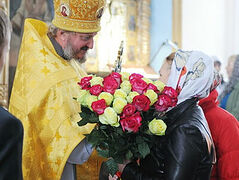The Evangelist Luke conveys the words of Christ: And if ye love them which love you, what thank have ye? for sinners also love those that love them. And if ye do good to them which do good to you, what thank have ye? for sinners also do even the same. And if ye lend to them of whom ye hope to receive, what thank have ye? for sinners also lend to sinners, to receive as much again (Luke 6:32–34).
The Evangelist Matthew also presents the Lord’s commandments about almsgiving, prayer, and fasting (Matthew 6), addressing the perspective of expected reward. It is said there that if someone gives alms, prays, or fasts for public recognition, they already receive their reward from people in the form of admiration and praise, and thus have no further reward from the Lord. But if one desires to do these acts for the Lord, then when giving alms, let not thy left hand know what thy right hand doeth (Matthew 6:3). When praying, enter into thy closet, and when thou hast shut thy door (Matthew 6:6). And when fasting, be not, as the hypocrites, of a sad countenance (Matthew 6:16-17).
Let us recall the life of St. Nicholas. At night, under the cover of darkness, he would sneak through the streets like a thief—not to steal, but to secretly drop a bundle of gold through the window of someone in need. In order to emerge from the darkness surrounding us and come to God, one must do everything in such a way that no praise or thanks is received from anyone. If something does not go according to your will, rejoice—for this means it went according to God’s will! In the same way, if you avoid receiving thanks from people, you can confidently expect a reward from Him.
For a true ascetic, even the great spiritual gifts received in this life from the Lord Himself cannot be a reason for boasting before others. For example, with what fear the Apostle Paul speaks of his glimpse of future bliss! He speaks as if not of himself, but of someone else: I knew a man in Christ above fourteen years ago, (whether in the body, I cannot tell; or whether out of the body, I cannot tell: God knoweth;) ... was caught up into paradise, and heard unspeakable words, which it is not lawful for a man to utter. Of such an one will I glory: yet of myself I will not glory, but in mine infirmities (2 Corinthians 12:2–5).
What the Apostle merely touched upon is the final reward—not only prepared but already declared as belonging to us. For even when we were dead in sins, hath quickened us together with Christ, (by grace ye are saved;) and hath raised us up together, and made us sit together in heavenly places in Christ Jesus (Ephesians 2:5–6). Everything else is like a small consolation to a capricious and impatient child, to calm him down and stop him from crying.




